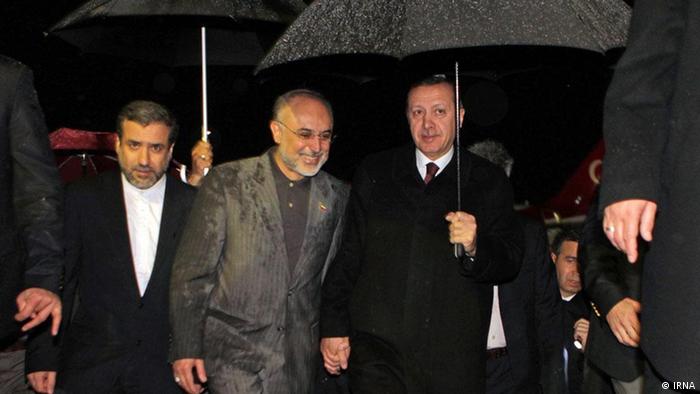Turkish Prime Minister Recep Tayyip Erdogan has begun a two-day visit to Tehran for talks on Iran's controversial nuclear program and the conflict in neighboring Syria.
The Turkish-Iranian talks in Tehran bring together two leaders with strongly diverging policies.
Iranian President Mahmoud Ahmadinejad backs Syrian President Bashar al-Assad while Erdogan's government, once a close ally of Syria, has increasingly switched to hosting Syrian dissidents and refugees.
On Monday, Turkey closed its embassy in Syria's capital Damascus, citing deteriorating conditions. The United Nations says more than 9,000 people have died during the Assad government's crackdown on protestors and armed rebels over the past year.
Turkey, a member of NATO with the second largest army in the Western military alliance, has also urged Assad to quit as a step toward ending the violence.
In contrast, Iran's official news agency IRNA quoted Ahmadinejad on Tuesday as praising Assad's government, saying Syrian officials were "managing the situation well."
Ahmadinejad also accused the West of plotting to overthrow the Syrian leadership in alliance with Arab countries - in an apparent reference to nations such as Saudi Arabia and Qatar, the current chair of the Arab League.
The Arab League convenes in Iraq's capital Baghdad on Thursday. Arab foreign ministers have already drafted a resolution that would call on Assad's government to "stop all actions of violence" and for all Syrian factions to begin "serious national dialogue" involving the UN-Arab League envoy Kofi Annan.
Turkeyoffering to host nuclear talks
During his visit to Iran, Erdogan is expected to outline a Turkish offer to again host nuclear talks in mid-April between Iran and six other nations. Britain, China, France, Germany, Russia and the United States have long suspected Iran of trying to develop nuclear weapons. Tehran, however, has insisted that its program is only for energy production and medical purposes.
The last and inconclusive round of the so-called Iran/P5+1 talks was held in Istanbul in January last year.
Since then, the United States and Europe have imposed sanctions to pressure Iran to give up its uranium enrichment practices. Turkey, however, has been cautious on curbing vital oil imports from its neighbor.
As Erdogan arrived on Wednesday, IRNA quoted Iran's Foreign Minister Ali Akbar Salehi as saying that Turkey's capital Istanbul would be the "best place" for a reopening of such talks on 13 April. He added, however, options for a venue were still being discussed.
Erdogan's visit to Tehran follows his attendance at a nuclear summit in South Korea with world leaders, including US President Barack Obama.
The Turkish delegation in Tehran includes numerous cabinet ministers and Turkish intelligence and military officials. Erdogan is also scheduled to open a Turkish cultural center in Iran.
ipj/mz (dpa, AFP, Reuters)

Comments